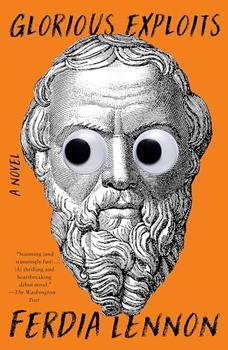Summary | Excerpt | Reviews | Beyond the book | Read-Alikes | Genres & Themes | Author Bio

A Novel
by Ferdia LennonLampo and Gelon are two unemployed potters in their thirties whose lives are spent between their usual tavern in Syracuse and the quarries where Athenian soldiers defeated in the Peloponnesian War have been left to die. Lampo, the narrator of the story, is roguish and irreverent, while Gelon is the sensitive and restrained counterpoint. Together they form a traditional comic duo, with their most common exchange involving a resounding "Quiet, Lampo."
Repetition is just one of the many comic tools Ferdia Lennon, who studied History and Classics at University College Dublin, employs in his literary debut. The most remarkable device, however, is the language in which the characters operate. Gelon and Lampo express themselves in modern Irish vernacular, a stylistic choice that not only contemporizes the narrative but also seeks to capture a sense of how marginalized individuals from ancient Sicily might have talked (see Beyond the Book).
From their language, they might be two unemployed thirty-somethings spending their day in a Dublin pub sitting in what could have been Joyce's chair. The only difference is that they live in 412 BCE, and sit in what could have been the chair of Homer, the poet in whom their friendship is rooted. As children, Lampo was the only one who would listen to Gelon's aspirations of becoming a singer and to his recitations of The Odyssey: "[I]f it weren't for Homer, we'd never have been mates," Lampo explains.
The love for stories, especially Athenian theatre, is what unites them, and what every morning brings them to the quarries, where they exchange food rations for verses of Euripides with the dying Athenians. They soon decide to take their passion for theatre a step further, organizing a production of both Medea and The Trojan Women with the prisoners of war, "to keep Euripides alive."
With this premise, Lennon weaves a story in which everyday Irish expressions such as "grand," "eejit," and "crack" coexist with Greek terms like "hubris," lyrical descriptions, and reflections on art, literature, and the power of stories. But as in all comedy—and as in all tragedy—the protagonists face obstacles: "It's poetry we are doing. It wouldn't mean a thing if it were easy."
The staging of an anti-war milestone like The Trojan Women with prisoners of war infuriates many, including characters with whom Gelon and Lampo have previously clashed. As the theatrical production progresses, Lennon builds palpable intrigue that culminates in the performance in the quarries, the novel's climax. He then takes the story further, with a final quarter that is more thrilling, intense, and raw, but slightly drawn out. It seems that in the final pages the author doesn't quite know where to stop, and the novel becomes a little maudlin and over-explained, with a perhaps unnecessary epilogue.
Despite this, the change in Lampo's voice at the end is noteworthy. In fact, Lampo is the character with the greatest evolution. The others resemble Euripides' Trojans: before the plot starts the characters' lives have already undergone an absolute transformation and, consequently, no substantial changes can be demanded from them. The same happens in Glorious Exploits: Gelon has lost his son and his wife; Tuireann, the play's producer, seems to hide a past of suffering; Lyra, Lampo's love interest, has been taken from Libya and made a slave; and the Athenians are on the verge of death. When the novel begins, Lampo's most notable hardship is a limp, which has prevented him from participating in the war. As the chapters progress, we see him try on different identities, as was also common in classical comedy. But these events, which unfold in just a few weeks, transform him. And in the end, everyone who survives Gelon and Lampo's enterprise heals a little. The novel leaves behind a comforting warmth, suggesting that in a world overshadowed by conflict and cruelty, stories can still offer hope and purpose. The question raised by the narrator lingers: Was it Euripides they were saving after all?
![]() This review was originally published in The BookBrowse Review in May 2024, and has been updated for the
April 2025 edition.
Click here to go to this issue.
This review was originally published in The BookBrowse Review in May 2024, and has been updated for the
April 2025 edition.
Click here to go to this issue.

If you liked Glorious Exploits, try these:

by M.T. Anderson
Published 2025
From the award-winning and bestselling author of Feed comes a raucous and slyly funny adult fiction debut, about the quest to steal the mystical bones of a long-dead saint

by Maria Reva
Published 2025
Set in Ukraine, an eccentric scientist breeding rare snails crosses paths with sisters posing as members of the marriage industry to find their activist mother. As Russia invades, they embark on a wild journey with kidnapped bachelors and a last-of-its-kind snail. This darkly comic novel explores survival, love, and the impact of war.
Your guide toexceptional books
BookBrowse seeks out and recommends the best in contemporary fiction and nonfiction—books that not only engage and entertain but also deepen our understanding of ourselves and the world around us.